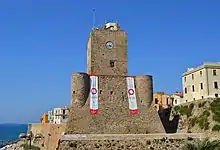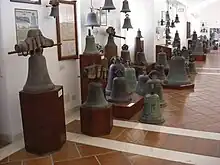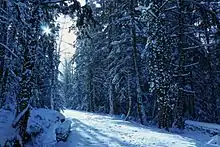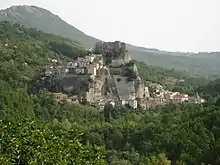Molise (Neapolitan: Mulìse) is a region of Southern Italy, on the Adriatic sea. It is Italy's second smallest region by land area, the second least populous and also the least known one. In spite of this, the region is rich in sights to offer to tourists intent on exploring this unexplored region.
Provinces
| Campobasso (CB) |
| Isernia (IS) |
Cities
Other destinations
Understand
Get in
By plane
Since Molise doesn't have airports the best choice is Abruzzo International Airport (PSR IATA), in the Adriatic city of Pescara. Another possibility is Rome Fiumicino Airport (FCO IATA). The regional bus company ATM offers connections with Pescara and Roma Tiburtina railway station, which is linked to Rome Airport.
By train
The main railway is the Adriatic railway, that crosses Molise along its coast. It provides efficient connections from the major cities of Northern Italy like Bologna, Milan and Turin, as well as from Apulia's main towns.
For more info visit the site of Trenitalia, the main railway operator of the country.
By car
Two toll motorways can be useful to reach the region:
 — Sun Motorway (Milan-Naples), exit of San Vittore del Lazio to reach Venafro in few minutes
— Sun Motorway (Milan-Naples), exit of San Vittore del Lazio to reach Venafro in few minutes — Adriatic Motorway (Bologna-Taranto), passes through Termoli and the molisan coast
— Adriatic Motorway (Bologna-Taranto), passes through Termoli and the molisan coast
For more info you can check the site of Autostrade per l'Italia.
Get around
By train
The railways system of the region has a total length of 265 km (164 mi) and counts 28 stations. Besides the Adriatic railway other internal lines are:
- Campobasso-Termoli railway (temporarily closed since 2016)
- Isernia-Campobasso railway
- Rocca d'Evandro-Venafro railway
- Vairano-Isernia railway
For more info visit the site of Trenitalia, the main railway operator of the country.
By car
Renting a car is probably the best choice to discover Molise. Strade statali (trunk roads) can be used for reaching internal destinations as well as the surrounding regions:
 — dell'Appennino Abruzzese e Appulo Sannitica, links Antrodoco to Foggia
— dell'Appennino Abruzzese e Appulo Sannitica, links Antrodoco to Foggia — Venafrana, links Teano to Pescolanciano
— Venafrana, links Teano to Pescolanciano — Sannitica, links Benevento to Termoli
— Sannitica, links Benevento to Termoli — della Val Fortore, links Benevento to Ripabottoni
— della Val Fortore, links Benevento to Ripabottoni — della Vandra, links Sora to Isernia
— della Vandra, links Sora to Isernia — Fondo Valle del Tappino, links Campobasso to Gambatesa
— Fondo Valle del Tappino, links Campobasso to Gambatesa — Fondo Valle del Biferno, links Bojano to Guglionesi
— Fondo Valle del Biferno, links Bojano to Guglionesi — Fondo Valle Trigno, links Isernia to San Salvo
— Fondo Valle Trigno, links Isernia to San Salvo — Fondo Valle Sangro, links Cerro al Volturno to Fossacesia
— Fondo Valle Sangro, links Cerro al Volturno to Fossacesia
See
Archaeological sites
.JPG.webp)
- 🌍 Isernia — The Lower Palaeolithic site of Isernia-La Pineta and numerous traces of its Roman period.
- 🌍 Larino — The remarkable Roman Amphitheater and Roman Forum of the important ancient town of Larinum.
- 🌍 Pietrabbondante — The Theater and the Italic temple, parts of the sacred area of the Roman city of Bovianum Vetus.
- 🌍 San Giovanni in Galdo — The Italic temple dating from the Samnite age.
- 🌍 San Vincenzo al Volturno — A 5th-century Benedictine Abbey rich of frescoes.
- 🌍 Sepino — Relevant remains of the Samnite village of Saipins and the Roman city of Saepinum.
- 🌍 Vastogirardi — The Italic temple, built by the Samnites during the 2nd century BC.
- 🌍 Venafro — Important remains of Samnite and Roman ages like the Amphitheater, a visitable aqueduct, a Theater and the urban walls.
Castles

- Angevin Castle in Civitacampomarano
- Castello D'Alessandro in Pescolanciano
- Castello Di Capua in Gambatesa
- Castello Monforte in Campobasso
- Castello Pandone in Cerro al Volturno
- Castle of Roccamandolfi
- Castello Sanfelice in Bagnoli del Trigno
- National Museum of Castello Pandone in Venafro
- Swabian castle in Termoli
Museums

- Antiquarium of Saepinum-Altilia
- Archaeological Museum of Isernia-Santa Maria delle Monache
- Archaeological Museum of Venafro
- Civic Museum of Larino
- Civic Museum of Memory and History in Isernia
- International Museum of the Bell in Agnone
- International Museum of the World Wars of Rocchetta al Volturno
- Museo di Comunità della Festa del Grano of Jelsi
- Mysteries' Museum of Campobasso
- National Paleolithic Museum of Isernia-La Pineta
- Samnite Museum of Campobasso
- Winter Line permanent exhibition in Venafro
Nature reserves

- National Park of Abruzzo, Lazio and Molise
- Collemeluccio Nature reserve
- Guardiaregia-Campochiaro Regional nature reserve (WWF Oasis)
- Oasis Le Mortine (WWF Oasis)
- Oasis of Bosco Casale (Casacalenda) (LIPU Oasis)
- Montedimezzo Nature reserve
- Pesche Nature reserve
- Regional Park of the Olive Tree of Venafro
- Torrente Callora Nature reserve
Villages

- 🌍 Capracotta — Important ski resort of Alto Molise.
- 🌍 Carovilli — Delightful ancient village with typical stone houses.
- 🌍 Castel del Giudice — Located at 800 meters of height on the border with Abruzzo and surrounded by beautiful apple orchards.
- 🌍 Pescopennataro — A center of Norman origins surrounded by the dense forests of Alto Molise.
- Pizzone — Situated in the National Park of Abruzzo, Lazio and Molise, it has preserved its three medieval gates.
- 🌍 Ripalimosani — Relevant religious architectures and the most authentic cuisine of the region.
- 🌍 Roccasicura — Of Samnite origin, declared reserve of UNESCO's Man and the Biosphere Programme (MAB).
- 🌍 San Pietro Avellana — In the uncontaminated nature of Alto Molise, renowned for the production of truffles.
- 🌍 Vastogirardi — Mountain village with relevant monuments and a Regional Nature reserve rich of flora and fauna.
Do
Eat
Drink
- Biferno — One of the most prestigious DOC wines of the region. It counts four varieties: red, red reserve, rosè and white.
- Pentro di Isernia — A DOC wine which counts three varieties: red, rosè and white.
- Tintilia del Molise — A DOC wine characterized by intense flavor and color. It counts three varieties: red, red reserve and rosè.
Stay safe
Theft, robberies and violent crimes are extremely rare. The region is generally safe.